Tucked away in the serene landscapes of Andhra Pradesh lies the captivating town of Lepakshi, a veritable treasure trove of India’s rich cultural heritage. Its 16th-century Veerabhadra Temple stands as a testament to the remarkable fusion of Hindu and Muslim artistic influences, showcasing intricate carvings and vibrant frescoes that have captivated visitors for centuries. Beyond the temple’s grandeur, Lepakshi offers a window into the living traditions of the region, where cultural performances and sacred rituals continue to thrive. Embark on this journey, and uncover the stories that have made Lepakshi a true gem in the crown of Indian art and architecture.
Key Points
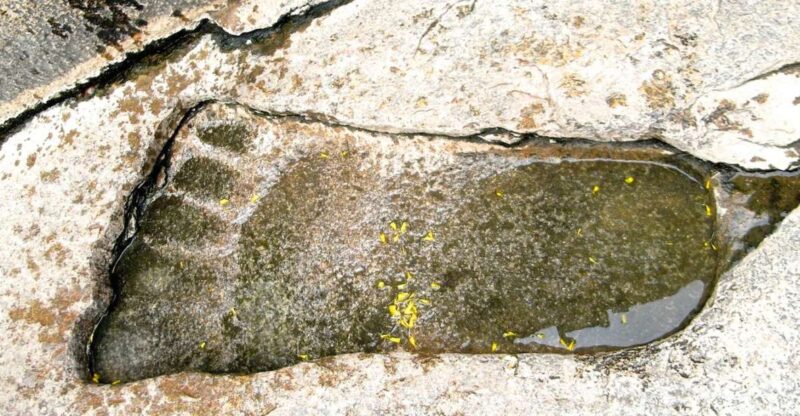
- The 8-hour journey from Bangalore takes visitors to Lepakshi, home to the largest Nandi Bull statue and the 16th-century Veerabhadra Temple.
- The Veerabhadra Temple is an architectural marvel blending Hindu and Muslim influences, showcasing intricate carvings and vibrant frescoes.
- The Mukha Mandapa within the temple hosts vibrant cultural performances, offering an immersive experience into Lepakshi’s rich heritage.
- The Artha Mandapa and Garbha Griha are sacred spaces adorned with intricate paintings and carvings, representing the convergence of mortal and celestial realms.
- The Kalyana Mandapa, a unique wedding hall dedicated to Lord Shiva and Lady Parvati, is a testament to Lepakshi’s enduring artistic legacy.
Tour Overview and Pricing
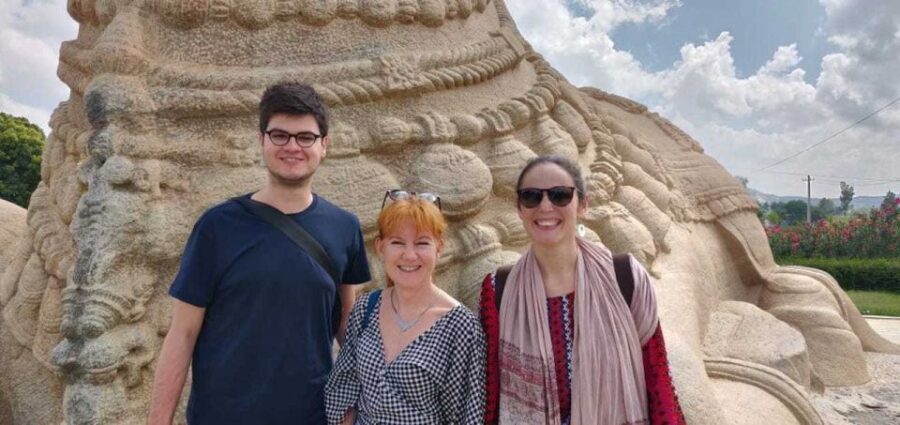
The tour offers a captivating exploration of the renowned temple art and architecture of Lepakshi, transporting visitors from Bangalore on an 8-hour journey to discover this cultural gem.
Priced at $130.93 per person, the tour includes hotel pickup and drop-off, private car transfer, a live English-speaking guide, and a delicious lunch.
Visitors can take advantage of the free cancellation policy up to 24 hours in advance for a full refund, or opt for the convenient reserve now and pay later option.
With a wealth of highlights, including the colossal Nandi Bull statue and the intricate wall paintings, this tour promises an immersive and unforgettable experience for those seeking to explore the rich heritage of Lepakshi.
You can also read our reviews of more tours and experiences in Bangalore.
Itinerary and Highlights
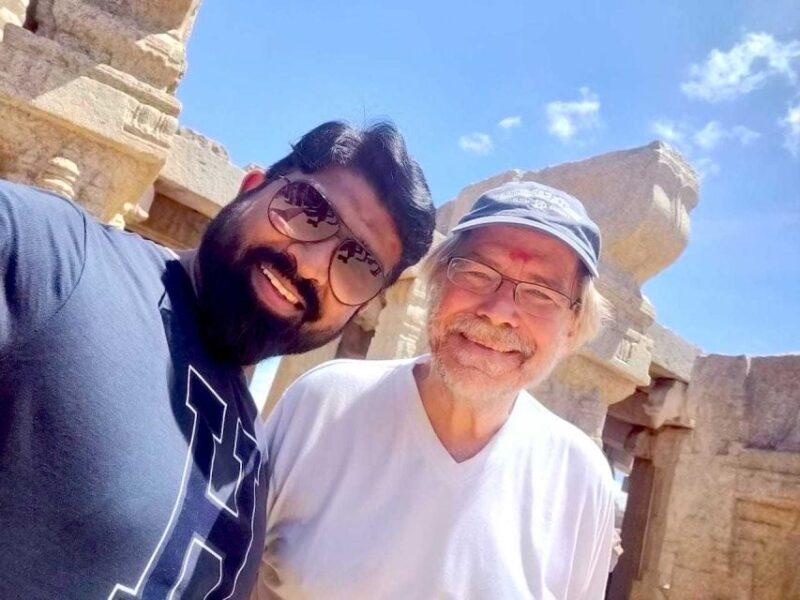
Departing from Bangalore after breakfast, the tour whisks visitors on a 2.5-hour drive to the captivating town of Lepakshi, where they’ll be greeted by India’s largest Nandi Bull statue.
Next, they’ll explore the 16th-century architectural masterpiece of the Veerabhadra Temple. Inside, the Mukha Mandapa serves as a dance venue and cultural hub, while the Artha Mandapa houses the king’s worship area and the Garbha Griha, home to the deity.
One of the highlights is the temple’s unique wedding hall, dedicated to Lord Shiva and Lady Parvati.
Along the way, guests will admire the exquisite wall paintings depicting textiles, hairstyles, and jewelry, uncovering the legends of the giants who built this magnificent temple.
Largest Nandi Bull Statue
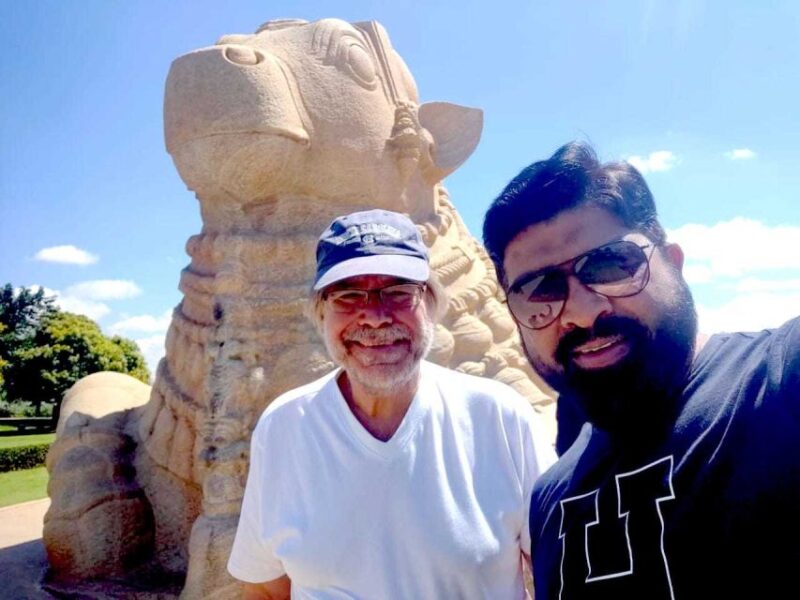
Towering over the landscape, India’s largest Nandi Bull statue greets visitors as they arrive at the captivating town of Lepakshi. This colossal sculpture, carved from a single piece of granite, stands an impressive 12 feet tall and 16 feet wide, commanding the attention of all who behold it.
The Nandi Bull, considered the sacred mount of Lord Shiva, is a symbol of strength, power, and devotion. As visitors approach the statue, they can’t help but feel a sense of awe and reverence, for this grand masterpiece isn’t just a physical structure, but a testament to the skilled craftsmanship and deep-rooted spirituality of Lepakshi’s ancient heritage.
Veerabhadra Temple Masterpiece
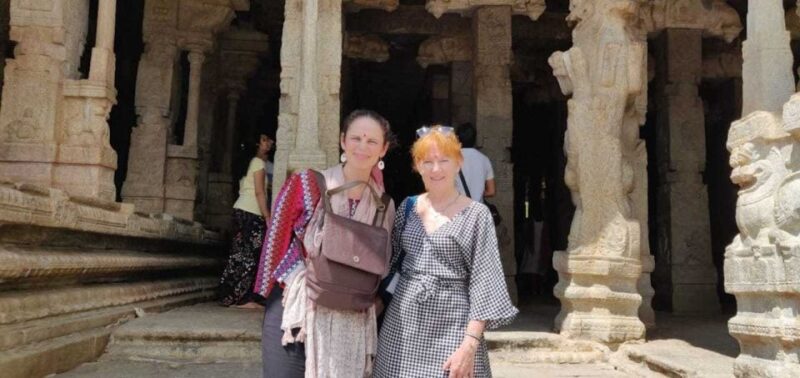
Nestled within the enchanting town of Lepakshi, the 16th-century Veerabhadra Temple stands as an architectural masterpiece, captivating visitors with its intricate carvings, vibrant frescoes, and rich historical significance.
Visitors can marvel at the temple’s remarkable design, which seamlessly blends Hindu and Muslim influences. The highlights of this temple include:
-
The Mukha Mandapa, a stunning dance venue where cultural performances and ceremonies take place.
-
The Artha Mandapa, the king’s worship area, which houses the deity in the Garbha Griha.
-
The unique wedding hall, where the legends of Lord Shiva and Lady Parvati are immortalized in the temple’s exquisite wall paintings.
Stepping inside this architectural wonder, one is transported to a bygone era, leaving an indelible impression on all who visit.
More Great Thing To Do NearbyCultural Activities at Mukha Mandapa
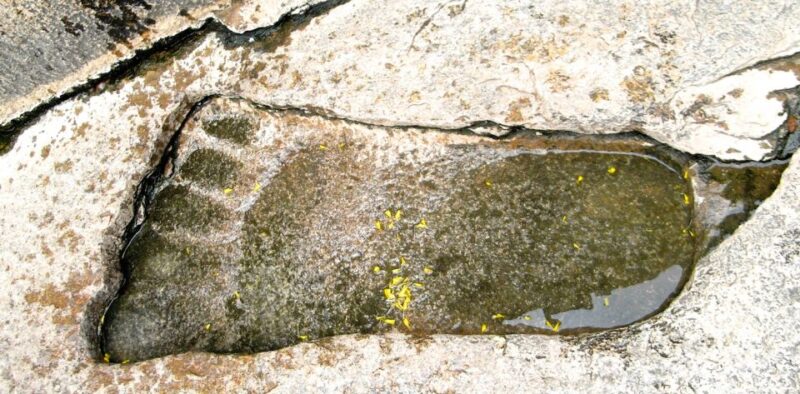
The Mukha Mandapa, the temple’s stunning dance venue, comes alive with a vibrant display of cultural performances and ceremonies that captivate visitors.
Stepping into this grand pavilion, one is immediately struck by the intricate carvings and ornate architectural details that adorn the space.
The atmosphere buzzes with energy as local artists take the stage, mesmerizing the audience with traditional dances, music, and rituals.
The rhythmic beats of drums and the melodic chants reverberate through the halls, transporting visitors to a bygone era.
Visitors can enjoy the rich cultural heritage of Lepakshi, witnessing first-hand the enduring traditions that have been preserved within this magnificent temple complex.
Artha Mandapa and Garbha Griha
Within the Veerabhadra Temple, the Artha Mandapa and Garbha Griha stand as the spiritual heart, where the devotees come to worship the revered deity enshrined within.
The Artha Mandapa, or the ‘King’s Worship Area,’ is where the monarch would perform sacred rituals and offerings. Beyond this lies the Garbha Griha, the sanctum sanctorum housing the main deity.
This hallowed chamber is a site of deep reverence, its walls adorned with intricate paintings and carvings that depict the divine legends. As visitors step inside, they’re transported to a realm where the mortal and the celestial converge, bearing witness to the timeless artistry that infuses this temple with a sacred, enduring spirit.
Unique Wedding Hall of Deities
Amidst the hallowed environs of the Veerabhadra Temple, devotees uncover a truly unique architectural marvel – the wedding hall of the revered deities, Lord Shiva and his consort, Lady Parvati.
This captivating space, known as the Kalyana Mandapa, is a testament to the temple’s rich cultural heritage and spiritual significance.
The intricate carvings and vibrant murals adorning the walls and ceilings transport visitors to a realm of divine beauty and celestial union.
Here, the gods’ eternal love is celebrated through awe-inspiring artistry, evoking a sense of reverence and wonder in all who behold this sacred sanctuary.
The Kalyana Mandapa stands as a profound embodiment of the temple’s enduring spiritual power and the deep devotion of the Lepakshi faithful.
Exquisite Wall Paintings and Legends
Adorning the sacred halls of the Veerabhadra Temple, an array of exquisite wall paintings captivate visitors, depicting intricate textile patterns, elegant hairstyles, and opulent jewelry that transport them to a bygone era.
These masterpieces, dating back to the 16th century, showcase the artistic prowess of the temple’s builders and paint a vivid picture of the region’s rich cultural heritage.
Among the standout features are:
-
Vibrant depictions of the temple’s construction, showcasing the architectural ingenuity of the time.
-
Intricate textile designs that offer a glimpse into the sartorial elegance of the era.
-
Captivating legends of the giants who are said to have constructed the temple, adding an air of mystique to the experience.
These awe-inspiring wall paintings not only enthrall visitors but also serve as a testament to Lepakshi’s enduring artistic legacy.
Frequently Asked Questions
Is the Tour Suitable for Children?
The tour can accommodate children, though visitors should note the temple’s footwear removal policy and dress code. With an engaging guide and fascinating history, the experience caters to travelers of all ages seeking a cultural adventure.
Can I Bring My Own Food and Drinks?
Travelers can bring their own food and drinks on the tour, but the package already includes a delicious lunch. Staying hydrated with water is encouraged, as the temple visit involves plenty of walking and exploration in the warm climate.
Are There Any Restrictions on Photography?
Photography is generally allowed at the Lepakshi temple site, but visitors mustn’t use flash or tripods. The guide will provide instructions on where and how to take photos respectfully during the tour.
Is the Tour Available in Other Languages?
The tour is currently offered in English, but the company may provide guides fluent in other languages upon request. Travelers should inquire about language options when booking to ensure they can fully engage with the cultural experience.
What Is the Best Time of Year to Visit Lepakshi?
The best time to visit Lepakshi is during the winter months of November through February. The weather’s pleasant, the crowds are smaller, and you’ll fully appreciate the site’s breathtaking wall paintings and architectural splendor without the intense summer heat.
Recap
Lepakshi’s enchanting temple art and architecture captivates visitors, transporting them through centuries of cultural confluence.
The colossal Nandi Bull, intricate Veerabhadra Temple carvings, and vibrant frescoes exemplify the region’s timeless mastery.
Performances in the Mukha and Artha Mandapa bring Lepakshi’s heritage to life, while the deities’ unique wedding hall and legendary wall paintings unveil the site’s profound spiritual allure.
This immersive journey offers a profound glimpse into India’s timeless artistic and cultural tapestry.
You can check if your dates are available here:More Tour Reviews in Bangalore
Not for you? Here's more things to do in Bangalore we have recnetly reviewed
- 3 Best Dining Experiences In Bangalore
- 9 Best 2 Day Tours In Bangalore
- 3 Best Dinner Tours In Bangalore
- 14 Best Full-Day Tours In Bangalore
- 2 Best 3 Day Tours In Bangalore
- 2 Best 4 Day Tours In Bangalore
- 16 Best Lunch Experiences In Bangalore
- 8 Best Food Tours In Bangalore
- The Historic Trail of the Southern Region Review
- Bangalore Home Cooking Demonstration Review
- Architecture With Beach & Hills Review
- Bangalore: Helicopter Joyride With Panoramic City Views
